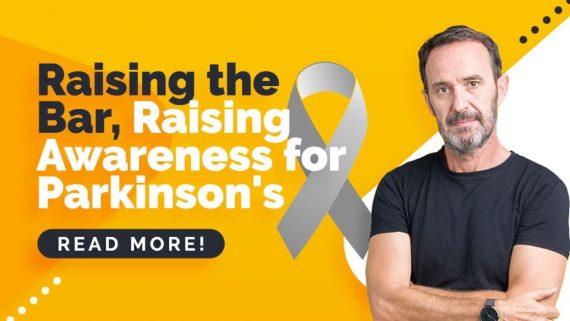Parkinson’s disease (PD) occurs when the dopamine-producing cells in the brain stop working or die off. PD is progressive and can cause tremors, slowness, stiffness, and other non-motor symptoms. April is Parkinson’s Awareness Month. This year’s theme is #KnowMorePD, focusing on raising the bar and raising awareness for Parkinson’s, and improving the lives of individuals affected.
5 Facts You May Not Know About Parkinson’s:
- British surgeon Dr. James Parkinson discovered it in 1817
- Around 500,000 new cases are diagnosed each year
- Most patients are middle-aged and diagnosed, on average, around age 56
- Small handwriting is an early warning sign
- It has no cure, but there are several effective treatments available

#KnowMorePD
Activities are underway as PD patients, loved ones, and caregivers share their stories, petition local governments, and join one of the many events taking place this month. The goal is to raise awareness about Parkinson’s disease and all the resources available to make patients’ lives better. You can get join the efforts by testing your knowledge of PD with a quiz. You can also learn more about it through any of the following resources:
- Podcast – Every other Tuesday, a new episode of Substantial Matters: Life and Science of Parkinson’s airs. Episodes focus on topics relevant to your daily life, including new therapies, exercise, clinical trials, nutrition, and more!
- Publications – The PD Library is an extensive collection of publications that can help you #KnowMorePD.
- Social media – Follow along and engage with @ParkinsonDotOrg on your social media platform of choice for the newest information for PD.
Volunteers Can Help Change the Future of Parkinson’s

Research initiatives continue to expand treatment options to people with Parkinson’s and, ultimately, help them live better with this condition. Volunteering for research gives you the power to help researchers understand how PD progresses and accelerates medical breakthroughs. To learn more about enrolling Parkinson’s disease studies at ActivMed Practices & Research, call (978) 992-4239, or visit our website.
References:
Intro
When a loved one is diagnosed with Parkinson’s Disease (PD), finding ways to provide help that is useful and impactful is not out of reach. You have resources that you can access, including recommendations straight from the Parkinson’s Foundation. If you have a loved one with Parkinson’s, you can help!
What is Parkinson’s?
PD is a neurodegenerative disorder. The disease affects the dopamine-producing neurons that are responsible for signaling the brain to move. Persons diagnosed either have low levels of the dopamine-producing neurons or have an absence of them.
Early stages of PD include loss of smell and writing that grows smaller over time as well as a minor tremor in your finger, thumb, hand, or chin while at rest.
Symptoms
The disease progression of PD differs for each person and develops slowly. There are five stages of the disease that range from zero (no symptoms) to 5 (advanced symptoms). While the disease itself is not fatal, complications from the disease can be serious. Generally common symptoms after onset can include:
- Tremor- Occurs mainly at rest and looks like the individual with PD is holding a pill between their thumb and forefinger and rolling it around continuously, known as ‘pill-rolling’
- Bradykinesia– Slowness of movement.
- Limb Rigidity-Stiffness in arms or legs.
- Gait/Balance Problems-Trouble walking or maintaining balance.
How you can Help
Now let’s take a look at some ways you can support your loved one after they have been diagnosed with Parkinson’s. Here are a few things the trusted experts recommend:
- Obtain Knowledge- Learn everything you can about Parkinson’s. For example, learning how the disease progresses can help you spot worsening of symptoms. parkinsons.org is a great resource.
- Call a Helpline- The Parkinson’s Disease Foundation helpline has specialist available to help navigate all things PD. This is a resource for those diagnosed and their caregivers. The number is 800.4PD.INFO.
- Set Up a Time to Help- Sometimes offering is not enough. Set up a date and time to help clean, meal prep, etc.
- Encourage Exercise- Research confirms exercise helps the brain use dopamine more effectively. It also helps with balance and strength. Encouraging your loved ones to stay active is important in the progression of PD.
- Listen- Whether it is a friendly ear, a shoulder to cry on, or a person to wipe the tears of frustration, listening is essential.
You Can be the Difference
As you can imagine, depression and anxiety are common in patients diagnosed with Parkinson’s. Your loved ones need your support during their journey through PD. You can be the difference in their quality of life by taking action now.
At ActivMed Practices & Research, Inc., we are committed to not only working with patients to find current treatments that will deliver the most impactful results, but also working to develop new treatment options through clinical studies.
If you or someone you love has been diagnosed with Parkinson’s Disease, ActivMed Practices & Research, Inc. currently has enrolling studies for those seeking new treatment options. Qualified candidates who participate will receive study-related care at no cost. There is also compensation for travel. To learn more and see how you or someone you love may qualify for a study, please click HERE.
References:
https://www.healthline.com/health/parkinsons-disease/how-to-support#1
https://www.parkinson.org/understanding-parkinsons/what-is-parkinsons
https://www.parkinson.org/Living-with-Parkinsons/Resources-and-Support





